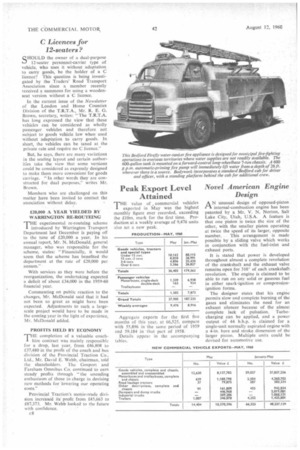C Licences for 12-seaters?
Page 48

If you've noticed an error in this article please click here to report it so we can fix it.
SHOULD the owner of a dual-purpose 12-seater personnel-carrier type of vehicle, who uses it without adaptation to carry goods, be the holder of a C licence? This question is being investigated by the Traders' Road Transport Association since a member recently received a summons for using a woodenseat version without a C licence.
In the current issue of the Newsletter of the London and Home Counties Division of the T.R.T.A., Mr. R. E. G. Brown, secretary, writes: "The T.R.T.A. has long expressed the view that these vehicles can be considered as wholly passenger vehicles and therefore not subject to goods vehicle law when used without adaptation to carry goods. In short, the vehicles can be taxed at the private rate and require no C licence."
But, he says, there arc many variations in the seating layout and certain authorities take the view that some versions could be considered as expressly designed to make them more convenient for goods carriage. "In other words they are constructed for dual purposes," writes Mr. Brown.
Members who are challenged on this matter have been invited to contact the association without delay.
£20,000 A YEAR YIELDED BY WARRINGTON RE-ROUTEING THE experimental re-routeing scheme I introduced by Warrington Transport Department last December is paying off to the tune of £20,000 a year. In his annual report, Mr. N. McDonald, general manager, who was responsible for the scheme, states: "Financially, it would seem that the scheme has benefited the department at the rate of £20,000 per annum."
With services as they were before the reorganization, the undertaking expected a deficit of about £34,000 in the 1959-60 financial year.
Commenting on public reaction to the changes, Mr. McDonald said that it had not been so great as might have been expected. Adjustments to such a largescale project would have to be made in the coming year in the light of experience, Mi. McDonald added.
PROFITS HELD BY ECONOMY THE completion of a valuable coach hire contract was mainly responsible for a drop, last year, from £46,808 to £37,480 in the profit of the coach and bus division of the Provincial Traction Co., Ltd., Mr. David E. Webb, chairman, told the shareholders. The Gosport and Fareham Omnibus Co. continued to earn steady profits through "'the unending enthusiasm of those in charge in devising new methods for lowering our operating costs."
Provincial Traction's motor-trade division increased its' profit from £45,663 to £87,373. Mr. Webb looked to the future with confidence.
c8
















































































































